NBNS3603 Reflection: Emotional and Social Intelligence in Nursing
VerifiedAdded on 2022/11/18
|9
|3300
|80
Essay
AI Summary
This essay, written by a nursing student, delves into the critical role of emotional and social intelligence in providing effective patient care. The reflection centers around a personal experience where the student encountered a challenging situation, highlighting the impact of personal stressors and a lack of emotional regulation on patient interaction. Utilizing David Kolb's reflective model, the essay meticulously analyzes the incident, exploring the student's feelings, thoughts, and actions. It identifies contributing factors such as time constraints, workplace dynamics, and financial pressures, which influenced the nurse's behavior. The essay emphasizes the importance of maintaining composure, adopting a positive attitude, and practicing self-care techniques like gratitude journaling. It also discusses the significance of clear communication with superiors and the implementation of proactive strategies to manage emotional responses in stressful situations. The student concludes by detailing the transformative impact of these insights on their approach to patient care, emphasizing a shift towards a more proactive and empathetic mindset.
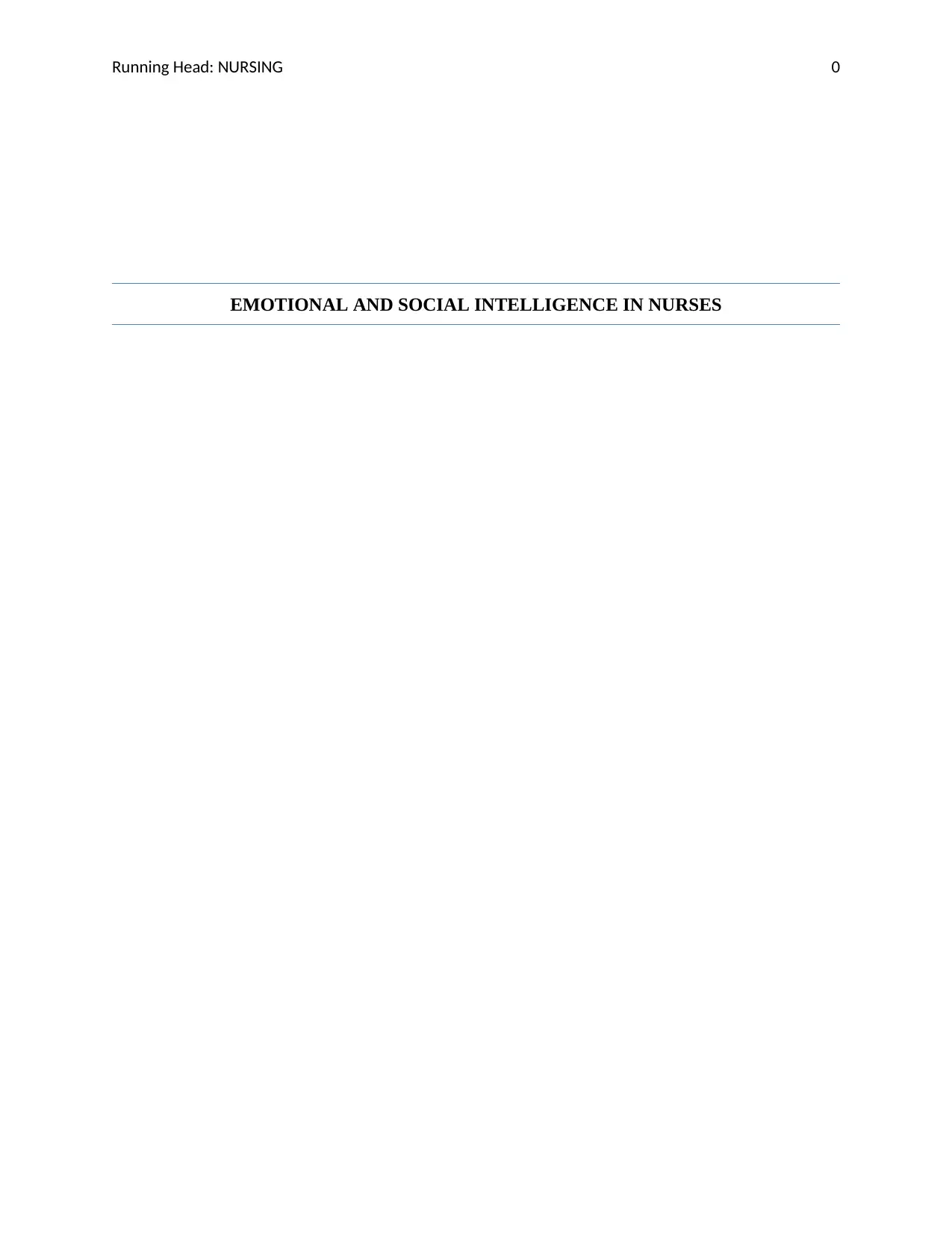
Running Head: NURSING 0
EMOTIONAL AND SOCIAL INTELLIGENCE IN NURSES
EMOTIONAL AND SOCIAL INTELLIGENCE IN NURSES
Paraphrase This Document
Need a fresh take? Get an instant paraphrase of this document with our AI Paraphraser
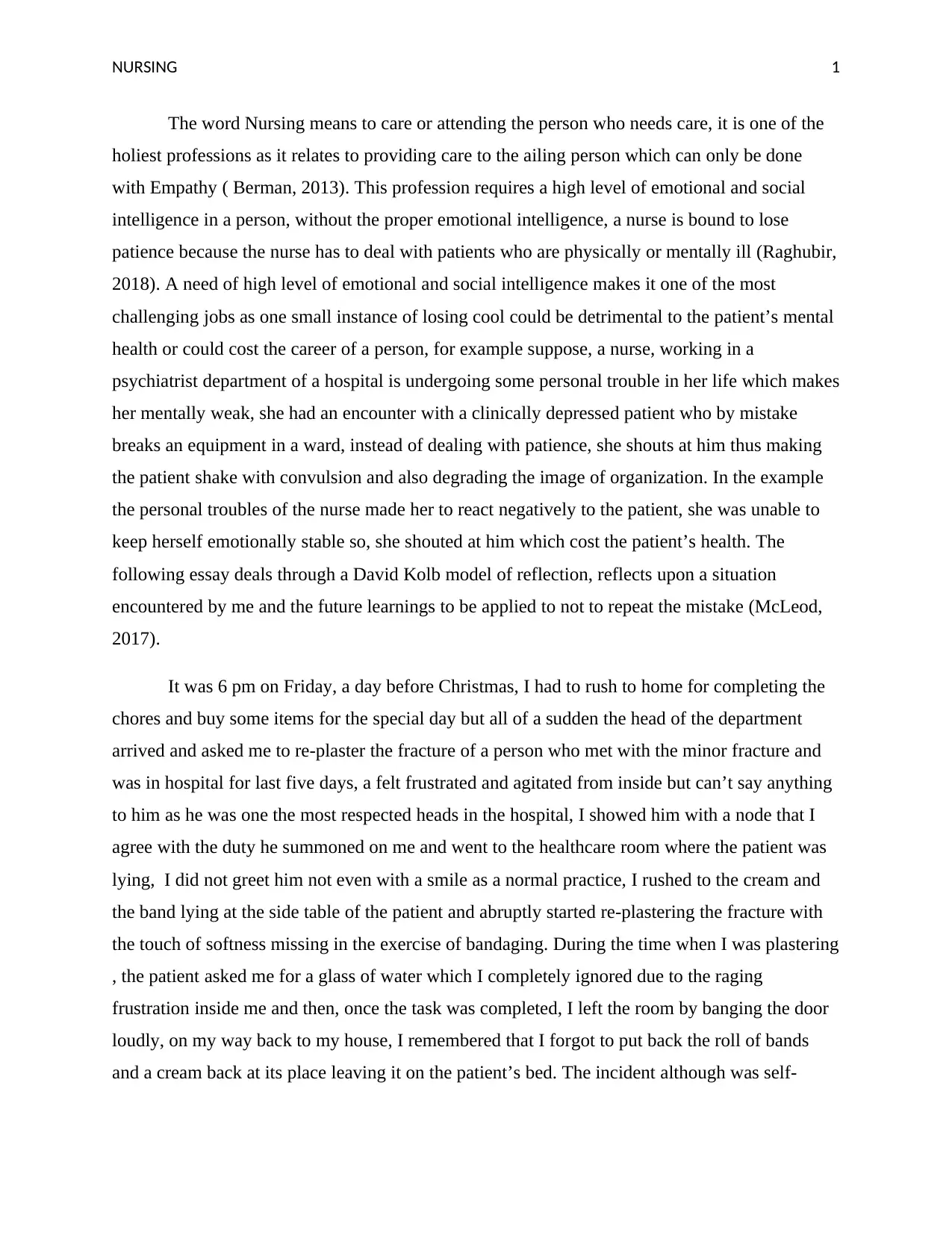
NURSING 1
The word Nursing means to care or attending the person who needs care, it is one of the
holiest professions as it relates to providing care to the ailing person which can only be done
with Empathy ( Berman, 2013). This profession requires a high level of emotional and social
intelligence in a person, without the proper emotional intelligence, a nurse is bound to lose
patience because the nurse has to deal with patients who are physically or mentally ill (Raghubir,
2018). A need of high level of emotional and social intelligence makes it one of the most
challenging jobs as one small instance of losing cool could be detrimental to the patient’s mental
health or could cost the career of a person, for example suppose, a nurse, working in a
psychiatrist department of a hospital is undergoing some personal trouble in her life which makes
her mentally weak, she had an encounter with a clinically depressed patient who by mistake
breaks an equipment in a ward, instead of dealing with patience, she shouts at him thus making
the patient shake with convulsion and also degrading the image of organization. In the example
the personal troubles of the nurse made her to react negatively to the patient, she was unable to
keep herself emotionally stable so, she shouted at him which cost the patient’s health. The
following essay deals through a David Kolb model of reflection, reflects upon a situation
encountered by me and the future learnings to be applied to not to repeat the mistake (McLeod,
2017).
It was 6 pm on Friday, a day before Christmas, I had to rush to home for completing the
chores and buy some items for the special day but all of a sudden the head of the department
arrived and asked me to re-plaster the fracture of a person who met with the minor fracture and
was in hospital for last five days, a felt frustrated and agitated from inside but can’t say anything
to him as he was one the most respected heads in the hospital, I showed him with a node that I
agree with the duty he summoned on me and went to the healthcare room where the patient was
lying, I did not greet him not even with a smile as a normal practice, I rushed to the cream and
the band lying at the side table of the patient and abruptly started re-plastering the fracture with
the touch of softness missing in the exercise of bandaging. During the time when I was plastering
, the patient asked me for a glass of water which I completely ignored due to the raging
frustration inside me and then, once the task was completed, I left the room by banging the door
loudly, on my way back to my house, I remembered that I forgot to put back the roll of bands
and a cream back at its place leaving it on the patient’s bed. The incident although was self-
The word Nursing means to care or attending the person who needs care, it is one of the
holiest professions as it relates to providing care to the ailing person which can only be done
with Empathy ( Berman, 2013). This profession requires a high level of emotional and social
intelligence in a person, without the proper emotional intelligence, a nurse is bound to lose
patience because the nurse has to deal with patients who are physically or mentally ill (Raghubir,
2018). A need of high level of emotional and social intelligence makes it one of the most
challenging jobs as one small instance of losing cool could be detrimental to the patient’s mental
health or could cost the career of a person, for example suppose, a nurse, working in a
psychiatrist department of a hospital is undergoing some personal trouble in her life which makes
her mentally weak, she had an encounter with a clinically depressed patient who by mistake
breaks an equipment in a ward, instead of dealing with patience, she shouts at him thus making
the patient shake with convulsion and also degrading the image of organization. In the example
the personal troubles of the nurse made her to react negatively to the patient, she was unable to
keep herself emotionally stable so, she shouted at him which cost the patient’s health. The
following essay deals through a David Kolb model of reflection, reflects upon a situation
encountered by me and the future learnings to be applied to not to repeat the mistake (McLeod,
2017).
It was 6 pm on Friday, a day before Christmas, I had to rush to home for completing the
chores and buy some items for the special day but all of a sudden the head of the department
arrived and asked me to re-plaster the fracture of a person who met with the minor fracture and
was in hospital for last five days, a felt frustrated and agitated from inside but can’t say anything
to him as he was one the most respected heads in the hospital, I showed him with a node that I
agree with the duty he summoned on me and went to the healthcare room where the patient was
lying, I did not greet him not even with a smile as a normal practice, I rushed to the cream and
the band lying at the side table of the patient and abruptly started re-plastering the fracture with
the touch of softness missing in the exercise of bandaging. During the time when I was plastering
, the patient asked me for a glass of water which I completely ignored due to the raging
frustration inside me and then, once the task was completed, I left the room by banging the door
loudly, on my way back to my house, I remembered that I forgot to put back the roll of bands
and a cream back at its place leaving it on the patient’s bed. The incident although was self-
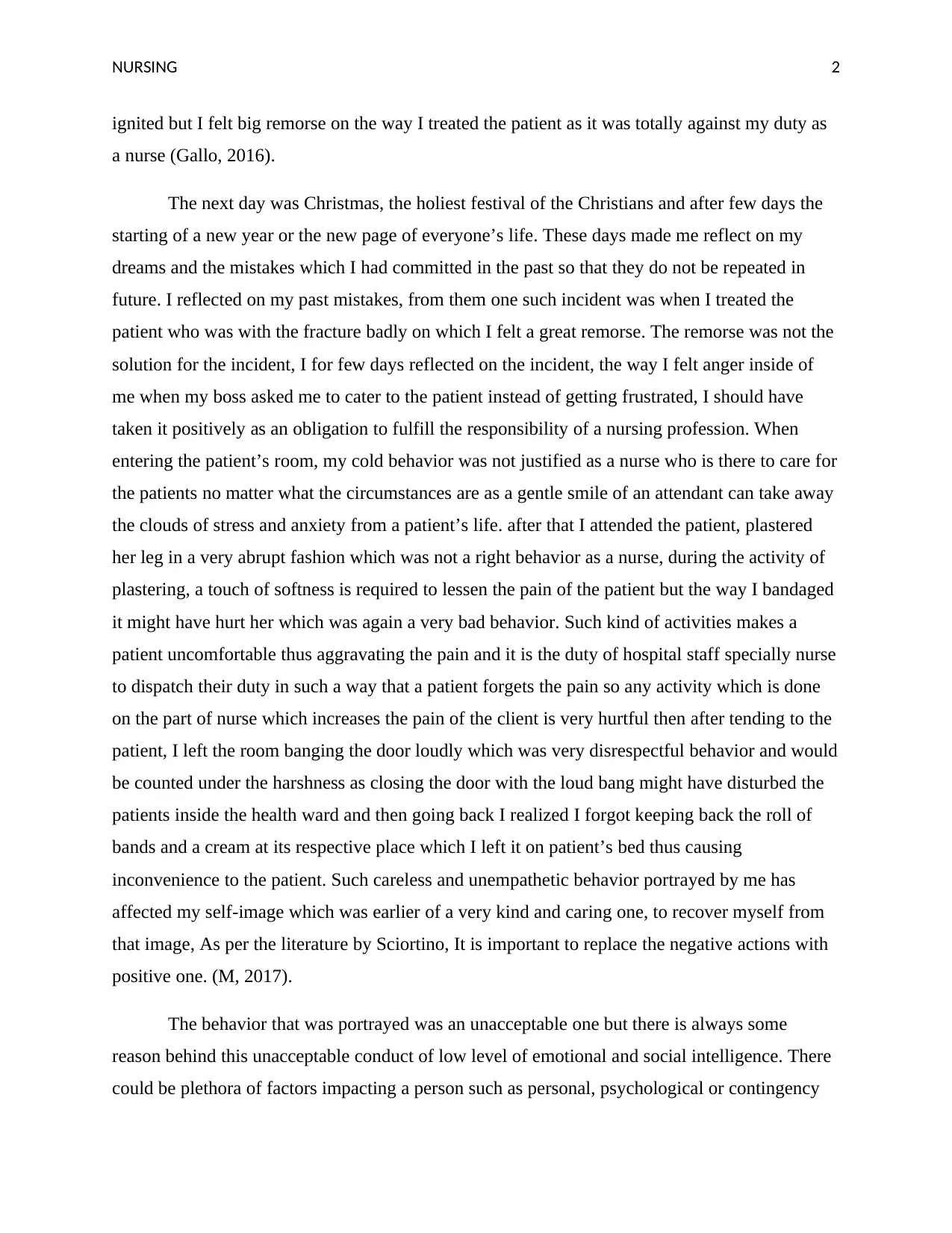
NURSING 2
ignited but I felt big remorse on the way I treated the patient as it was totally against my duty as
a nurse (Gallo, 2016).
The next day was Christmas, the holiest festival of the Christians and after few days the
starting of a new year or the new page of everyone’s life. These days made me reflect on my
dreams and the mistakes which I had committed in the past so that they do not be repeated in
future. I reflected on my past mistakes, from them one such incident was when I treated the
patient who was with the fracture badly on which I felt a great remorse. The remorse was not the
solution for the incident, I for few days reflected on the incident, the way I felt anger inside of
me when my boss asked me to cater to the patient instead of getting frustrated, I should have
taken it positively as an obligation to fulfill the responsibility of a nursing profession. When
entering the patient’s room, my cold behavior was not justified as a nurse who is there to care for
the patients no matter what the circumstances are as a gentle smile of an attendant can take away
the clouds of stress and anxiety from a patient’s life. after that I attended the patient, plastered
her leg in a very abrupt fashion which was not a right behavior as a nurse, during the activity of
plastering, a touch of softness is required to lessen the pain of the patient but the way I bandaged
it might have hurt her which was again a very bad behavior. Such kind of activities makes a
patient uncomfortable thus aggravating the pain and it is the duty of hospital staff specially nurse
to dispatch their duty in such a way that a patient forgets the pain so any activity which is done
on the part of nurse which increases the pain of the client is very hurtful then after tending to the
patient, I left the room banging the door loudly which was very disrespectful behavior and would
be counted under the harshness as closing the door with the loud bang might have disturbed the
patients inside the health ward and then going back I realized I forgot keeping back the roll of
bands and a cream at its respective place which I left it on patient’s bed thus causing
inconvenience to the patient. Such careless and unempathetic behavior portrayed by me has
affected my self-image which was earlier of a very kind and caring one, to recover myself from
that image, As per the literature by Sciortino, It is important to replace the negative actions with
positive one. (M, 2017).
The behavior that was portrayed was an unacceptable one but there is always some
reason behind this unacceptable conduct of low level of emotional and social intelligence. There
could be plethora of factors impacting a person such as personal, psychological or contingency
ignited but I felt big remorse on the way I treated the patient as it was totally against my duty as
a nurse (Gallo, 2016).
The next day was Christmas, the holiest festival of the Christians and after few days the
starting of a new year or the new page of everyone’s life. These days made me reflect on my
dreams and the mistakes which I had committed in the past so that they do not be repeated in
future. I reflected on my past mistakes, from them one such incident was when I treated the
patient who was with the fracture badly on which I felt a great remorse. The remorse was not the
solution for the incident, I for few days reflected on the incident, the way I felt anger inside of
me when my boss asked me to cater to the patient instead of getting frustrated, I should have
taken it positively as an obligation to fulfill the responsibility of a nursing profession. When
entering the patient’s room, my cold behavior was not justified as a nurse who is there to care for
the patients no matter what the circumstances are as a gentle smile of an attendant can take away
the clouds of stress and anxiety from a patient’s life. after that I attended the patient, plastered
her leg in a very abrupt fashion which was not a right behavior as a nurse, during the activity of
plastering, a touch of softness is required to lessen the pain of the patient but the way I bandaged
it might have hurt her which was again a very bad behavior. Such kind of activities makes a
patient uncomfortable thus aggravating the pain and it is the duty of hospital staff specially nurse
to dispatch their duty in such a way that a patient forgets the pain so any activity which is done
on the part of nurse which increases the pain of the client is very hurtful then after tending to the
patient, I left the room banging the door loudly which was very disrespectful behavior and would
be counted under the harshness as closing the door with the loud bang might have disturbed the
patients inside the health ward and then going back I realized I forgot keeping back the roll of
bands and a cream at its respective place which I left it on patient’s bed thus causing
inconvenience to the patient. Such careless and unempathetic behavior portrayed by me has
affected my self-image which was earlier of a very kind and caring one, to recover myself from
that image, As per the literature by Sciortino, It is important to replace the negative actions with
positive one. (M, 2017).
The behavior that was portrayed was an unacceptable one but there is always some
reason behind this unacceptable conduct of low level of emotional and social intelligence. There
could be plethora of factors impacting a person such as personal, psychological or contingency
⊘ This is a preview!⊘
Do you want full access?
Subscribe today to unlock all pages.

Trusted by 1+ million students worldwide
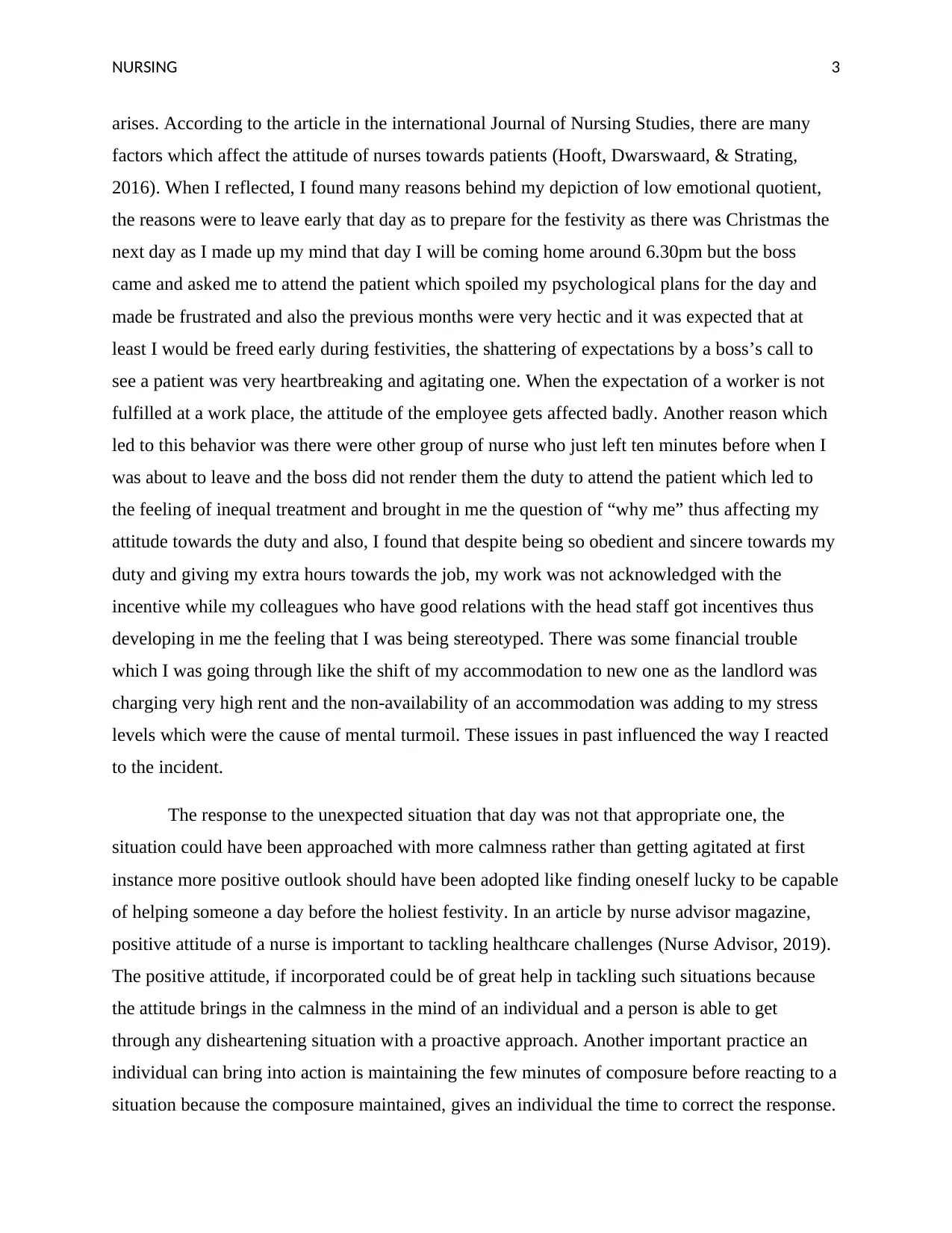
NURSING 3
arises. According to the article in the international Journal of Nursing Studies, there are many
factors which affect the attitude of nurses towards patients (Hooft, Dwarswaard, & Strating,
2016). When I reflected, I found many reasons behind my depiction of low emotional quotient,
the reasons were to leave early that day as to prepare for the festivity as there was Christmas the
next day as I made up my mind that day I will be coming home around 6.30pm but the boss
came and asked me to attend the patient which spoiled my psychological plans for the day and
made be frustrated and also the previous months were very hectic and it was expected that at
least I would be freed early during festivities, the shattering of expectations by a boss’s call to
see a patient was very heartbreaking and agitating one. When the expectation of a worker is not
fulfilled at a work place, the attitude of the employee gets affected badly. Another reason which
led to this behavior was there were other group of nurse who just left ten minutes before when I
was about to leave and the boss did not render them the duty to attend the patient which led to
the feeling of inequal treatment and brought in me the question of “why me” thus affecting my
attitude towards the duty and also, I found that despite being so obedient and sincere towards my
duty and giving my extra hours towards the job, my work was not acknowledged with the
incentive while my colleagues who have good relations with the head staff got incentives thus
developing in me the feeling that I was being stereotyped. There was some financial trouble
which I was going through like the shift of my accommodation to new one as the landlord was
charging very high rent and the non-availability of an accommodation was adding to my stress
levels which were the cause of mental turmoil. These issues in past influenced the way I reacted
to the incident.
The response to the unexpected situation that day was not that appropriate one, the
situation could have been approached with more calmness rather than getting agitated at first
instance more positive outlook should have been adopted like finding oneself lucky to be capable
of helping someone a day before the holiest festivity. In an article by nurse advisor magazine,
positive attitude of a nurse is important to tackling healthcare challenges (Nurse Advisor, 2019).
The positive attitude, if incorporated could be of great help in tackling such situations because
the attitude brings in the calmness in the mind of an individual and a person is able to get
through any disheartening situation with a proactive approach. Another important practice an
individual can bring into action is maintaining the few minutes of composure before reacting to a
situation because the composure maintained, gives an individual the time to correct the response.
arises. According to the article in the international Journal of Nursing Studies, there are many
factors which affect the attitude of nurses towards patients (Hooft, Dwarswaard, & Strating,
2016). When I reflected, I found many reasons behind my depiction of low emotional quotient,
the reasons were to leave early that day as to prepare for the festivity as there was Christmas the
next day as I made up my mind that day I will be coming home around 6.30pm but the boss
came and asked me to attend the patient which spoiled my psychological plans for the day and
made be frustrated and also the previous months were very hectic and it was expected that at
least I would be freed early during festivities, the shattering of expectations by a boss’s call to
see a patient was very heartbreaking and agitating one. When the expectation of a worker is not
fulfilled at a work place, the attitude of the employee gets affected badly. Another reason which
led to this behavior was there were other group of nurse who just left ten minutes before when I
was about to leave and the boss did not render them the duty to attend the patient which led to
the feeling of inequal treatment and brought in me the question of “why me” thus affecting my
attitude towards the duty and also, I found that despite being so obedient and sincere towards my
duty and giving my extra hours towards the job, my work was not acknowledged with the
incentive while my colleagues who have good relations with the head staff got incentives thus
developing in me the feeling that I was being stereotyped. There was some financial trouble
which I was going through like the shift of my accommodation to new one as the landlord was
charging very high rent and the non-availability of an accommodation was adding to my stress
levels which were the cause of mental turmoil. These issues in past influenced the way I reacted
to the incident.
The response to the unexpected situation that day was not that appropriate one, the
situation could have been approached with more calmness rather than getting agitated at first
instance more positive outlook should have been adopted like finding oneself lucky to be capable
of helping someone a day before the holiest festivity. In an article by nurse advisor magazine,
positive attitude of a nurse is important to tackling healthcare challenges (Nurse Advisor, 2019).
The positive attitude, if incorporated could be of great help in tackling such situations because
the attitude brings in the calmness in the mind of an individual and a person is able to get
through any disheartening situation with a proactive approach. Another important practice an
individual can bring into action is maintaining the few minutes of composure before reacting to a
situation because the composure maintained, gives an individual the time to correct the response.
Paraphrase This Document
Need a fresh take? Get an instant paraphrase of this document with our AI Paraphraser
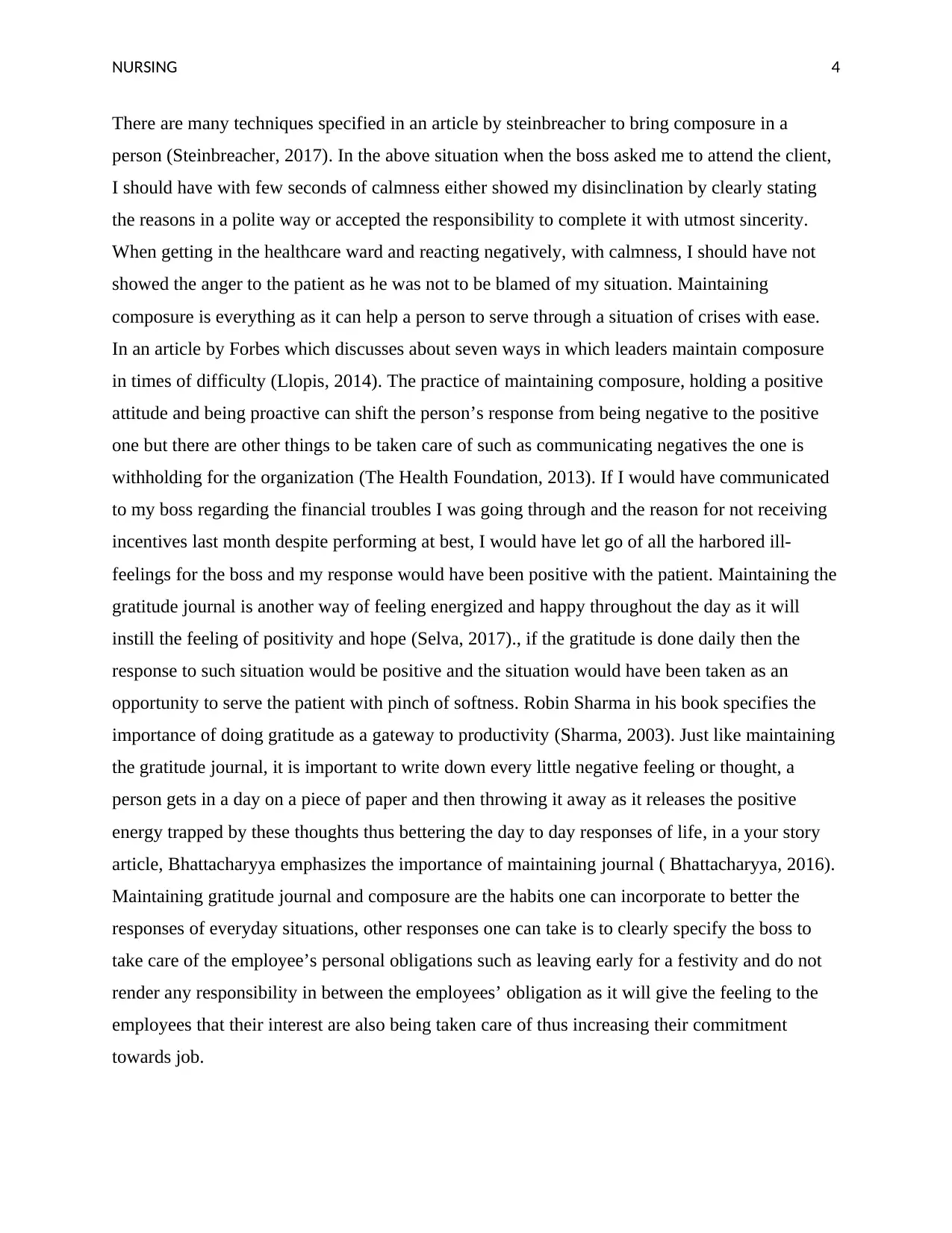
NURSING 4
There are many techniques specified in an article by steinbreacher to bring composure in a
person (Steinbreacher, 2017). In the above situation when the boss asked me to attend the client,
I should have with few seconds of calmness either showed my disinclination by clearly stating
the reasons in a polite way or accepted the responsibility to complete it with utmost sincerity.
When getting in the healthcare ward and reacting negatively, with calmness, I should have not
showed the anger to the patient as he was not to be blamed of my situation. Maintaining
composure is everything as it can help a person to serve through a situation of crises with ease.
In an article by Forbes which discusses about seven ways in which leaders maintain composure
in times of difficulty (Llopis, 2014). The practice of maintaining composure, holding a positive
attitude and being proactive can shift the person’s response from being negative to the positive
one but there are other things to be taken care of such as communicating negatives the one is
withholding for the organization (The Health Foundation, 2013). If I would have communicated
to my boss regarding the financial troubles I was going through and the reason for not receiving
incentives last month despite performing at best, I would have let go of all the harbored ill-
feelings for the boss and my response would have been positive with the patient. Maintaining the
gratitude journal is another way of feeling energized and happy throughout the day as it will
instill the feeling of positivity and hope (Selva, 2017)., if the gratitude is done daily then the
response to such situation would be positive and the situation would have been taken as an
opportunity to serve the patient with pinch of softness. Robin Sharma in his book specifies the
importance of doing gratitude as a gateway to productivity (Sharma, 2003). Just like maintaining
the gratitude journal, it is important to write down every little negative feeling or thought, a
person gets in a day on a piece of paper and then throwing it away as it releases the positive
energy trapped by these thoughts thus bettering the day to day responses of life, in a your story
article, Bhattacharyya emphasizes the importance of maintaining journal ( Bhattacharyya, 2016).
Maintaining gratitude journal and composure are the habits one can incorporate to better the
responses of everyday situations, other responses one can take is to clearly specify the boss to
take care of the employee’s personal obligations such as leaving early for a festivity and do not
render any responsibility in between the employees’ obligation as it will give the feeling to the
employees that their interest are also being taken care of thus increasing their commitment
towards job.
There are many techniques specified in an article by steinbreacher to bring composure in a
person (Steinbreacher, 2017). In the above situation when the boss asked me to attend the client,
I should have with few seconds of calmness either showed my disinclination by clearly stating
the reasons in a polite way or accepted the responsibility to complete it with utmost sincerity.
When getting in the healthcare ward and reacting negatively, with calmness, I should have not
showed the anger to the patient as he was not to be blamed of my situation. Maintaining
composure is everything as it can help a person to serve through a situation of crises with ease.
In an article by Forbes which discusses about seven ways in which leaders maintain composure
in times of difficulty (Llopis, 2014). The practice of maintaining composure, holding a positive
attitude and being proactive can shift the person’s response from being negative to the positive
one but there are other things to be taken care of such as communicating negatives the one is
withholding for the organization (The Health Foundation, 2013). If I would have communicated
to my boss regarding the financial troubles I was going through and the reason for not receiving
incentives last month despite performing at best, I would have let go of all the harbored ill-
feelings for the boss and my response would have been positive with the patient. Maintaining the
gratitude journal is another way of feeling energized and happy throughout the day as it will
instill the feeling of positivity and hope (Selva, 2017)., if the gratitude is done daily then the
response to such situation would be positive and the situation would have been taken as an
opportunity to serve the patient with pinch of softness. Robin Sharma in his book specifies the
importance of doing gratitude as a gateway to productivity (Sharma, 2003). Just like maintaining
the gratitude journal, it is important to write down every little negative feeling or thought, a
person gets in a day on a piece of paper and then throwing it away as it releases the positive
energy trapped by these thoughts thus bettering the day to day responses of life, in a your story
article, Bhattacharyya emphasizes the importance of maintaining journal ( Bhattacharyya, 2016).
Maintaining gratitude journal and composure are the habits one can incorporate to better the
responses of everyday situations, other responses one can take is to clearly specify the boss to
take care of the employee’s personal obligations such as leaving early for a festivity and do not
render any responsibility in between the employees’ obligation as it will give the feeling to the
employees that their interest are also being taken care of thus increasing their commitment
towards job.
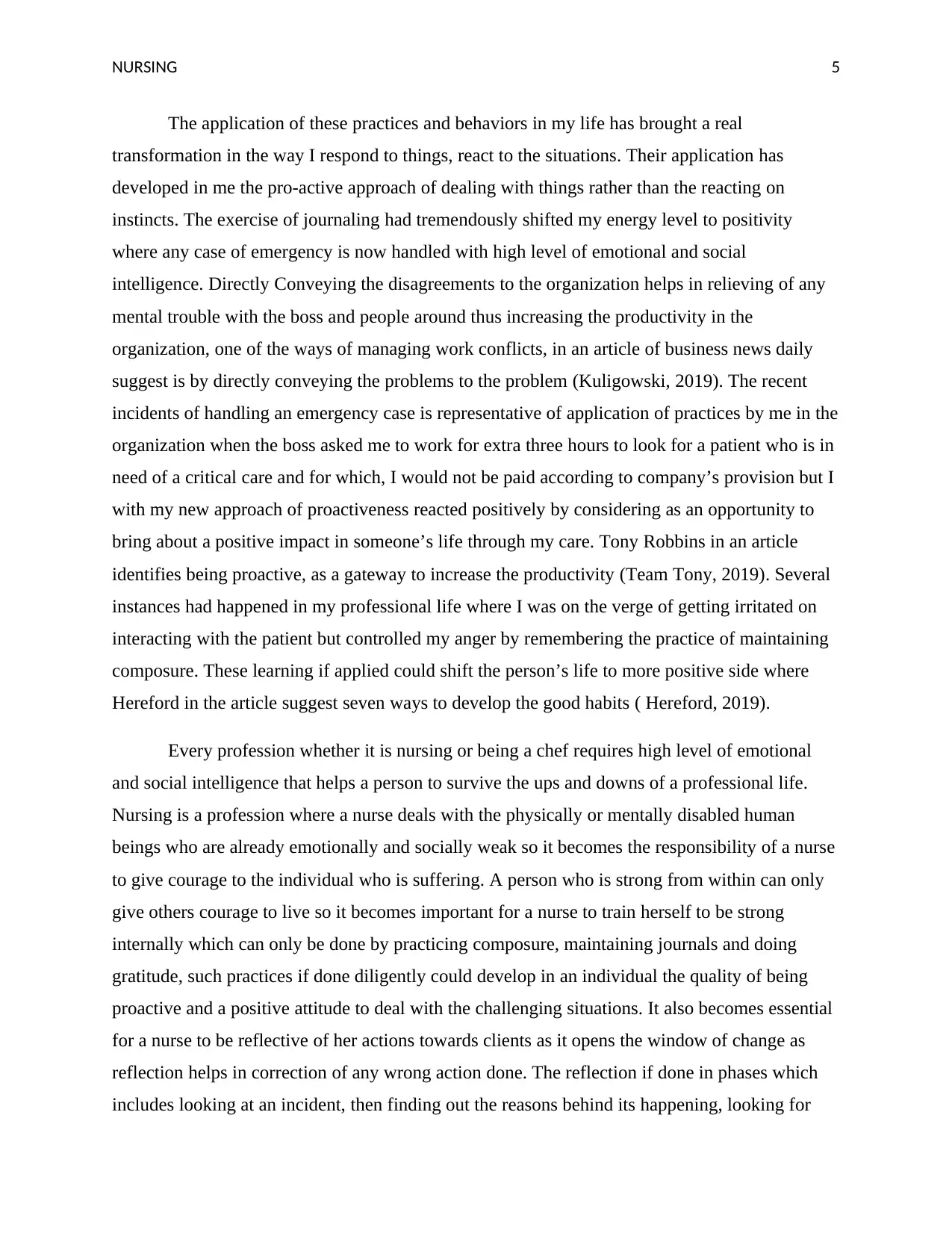
NURSING 5
The application of these practices and behaviors in my life has brought a real
transformation in the way I respond to things, react to the situations. Their application has
developed in me the pro-active approach of dealing with things rather than the reacting on
instincts. The exercise of journaling had tremendously shifted my energy level to positivity
where any case of emergency is now handled with high level of emotional and social
intelligence. Directly Conveying the disagreements to the organization helps in relieving of any
mental trouble with the boss and people around thus increasing the productivity in the
organization, one of the ways of managing work conflicts, in an article of business news daily
suggest is by directly conveying the problems to the problem (Kuligowski, 2019). The recent
incidents of handling an emergency case is representative of application of practices by me in the
organization when the boss asked me to work for extra three hours to look for a patient who is in
need of a critical care and for which, I would not be paid according to company’s provision but I
with my new approach of proactiveness reacted positively by considering as an opportunity to
bring about a positive impact in someone’s life through my care. Tony Robbins in an article
identifies being proactive, as a gateway to increase the productivity (Team Tony, 2019). Several
instances had happened in my professional life where I was on the verge of getting irritated on
interacting with the patient but controlled my anger by remembering the practice of maintaining
composure. These learning if applied could shift the person’s life to more positive side where
Hereford in the article suggest seven ways to develop the good habits ( Hereford, 2019).
Every profession whether it is nursing or being a chef requires high level of emotional
and social intelligence that helps a person to survive the ups and downs of a professional life.
Nursing is a profession where a nurse deals with the physically or mentally disabled human
beings who are already emotionally and socially weak so it becomes the responsibility of a nurse
to give courage to the individual who is suffering. A person who is strong from within can only
give others courage to live so it becomes important for a nurse to train herself to be strong
internally which can only be done by practicing composure, maintaining journals and doing
gratitude, such practices if done diligently could develop in an individual the quality of being
proactive and a positive attitude to deal with the challenging situations. It also becomes essential
for a nurse to be reflective of her actions towards clients as it opens the window of change as
reflection helps in correction of any wrong action done. The reflection if done in phases which
includes looking at an incident, then finding out the reasons behind its happening, looking for
The application of these practices and behaviors in my life has brought a real
transformation in the way I respond to things, react to the situations. Their application has
developed in me the pro-active approach of dealing with things rather than the reacting on
instincts. The exercise of journaling had tremendously shifted my energy level to positivity
where any case of emergency is now handled with high level of emotional and social
intelligence. Directly Conveying the disagreements to the organization helps in relieving of any
mental trouble with the boss and people around thus increasing the productivity in the
organization, one of the ways of managing work conflicts, in an article of business news daily
suggest is by directly conveying the problems to the problem (Kuligowski, 2019). The recent
incidents of handling an emergency case is representative of application of practices by me in the
organization when the boss asked me to work for extra three hours to look for a patient who is in
need of a critical care and for which, I would not be paid according to company’s provision but I
with my new approach of proactiveness reacted positively by considering as an opportunity to
bring about a positive impact in someone’s life through my care. Tony Robbins in an article
identifies being proactive, as a gateway to increase the productivity (Team Tony, 2019). Several
instances had happened in my professional life where I was on the verge of getting irritated on
interacting with the patient but controlled my anger by remembering the practice of maintaining
composure. These learning if applied could shift the person’s life to more positive side where
Hereford in the article suggest seven ways to develop the good habits ( Hereford, 2019).
Every profession whether it is nursing or being a chef requires high level of emotional
and social intelligence that helps a person to survive the ups and downs of a professional life.
Nursing is a profession where a nurse deals with the physically or mentally disabled human
beings who are already emotionally and socially weak so it becomes the responsibility of a nurse
to give courage to the individual who is suffering. A person who is strong from within can only
give others courage to live so it becomes important for a nurse to train herself to be strong
internally which can only be done by practicing composure, maintaining journals and doing
gratitude, such practices if done diligently could develop in an individual the quality of being
proactive and a positive attitude to deal with the challenging situations. It also becomes essential
for a nurse to be reflective of her actions towards clients as it opens the window of change as
reflection helps in correction of any wrong action done. The reflection if done in phases which
includes looking at an incident, then finding out the reasons behind its happening, looking for
⊘ This is a preview!⊘
Do you want full access?
Subscribe today to unlock all pages.

Trusted by 1+ million students worldwide
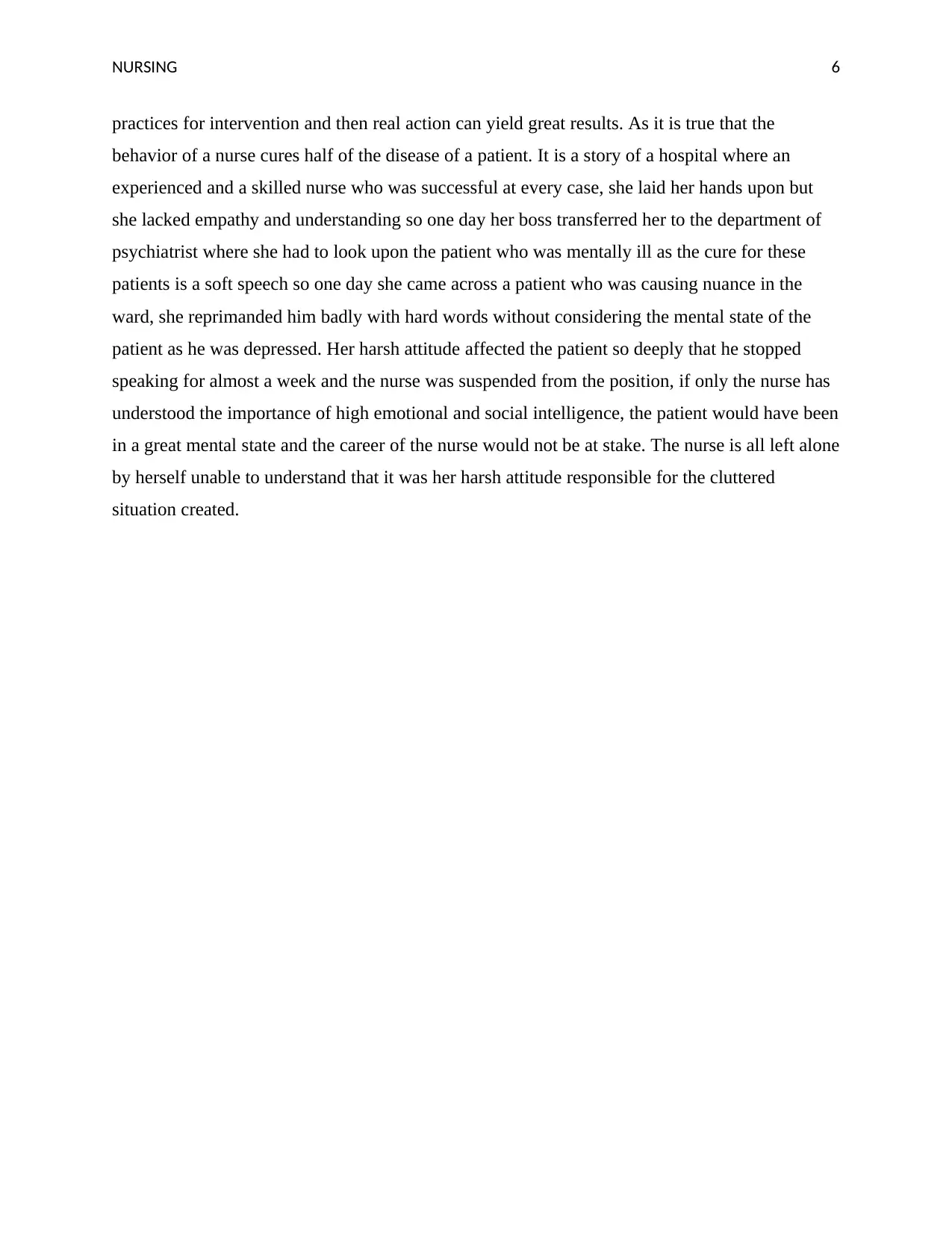
NURSING 6
practices for intervention and then real action can yield great results. As it is true that the
behavior of a nurse cures half of the disease of a patient. It is a story of a hospital where an
experienced and a skilled nurse who was successful at every case, she laid her hands upon but
she lacked empathy and understanding so one day her boss transferred her to the department of
psychiatrist where she had to look upon the patient who was mentally ill as the cure for these
patients is a soft speech so one day she came across a patient who was causing nuance in the
ward, she reprimanded him badly with hard words without considering the mental state of the
patient as he was depressed. Her harsh attitude affected the patient so deeply that he stopped
speaking for almost a week and the nurse was suspended from the position, if only the nurse has
understood the importance of high emotional and social intelligence, the patient would have been
in a great mental state and the career of the nurse would not be at stake. The nurse is all left alone
by herself unable to understand that it was her harsh attitude responsible for the cluttered
situation created.
practices for intervention and then real action can yield great results. As it is true that the
behavior of a nurse cures half of the disease of a patient. It is a story of a hospital where an
experienced and a skilled nurse who was successful at every case, she laid her hands upon but
she lacked empathy and understanding so one day her boss transferred her to the department of
psychiatrist where she had to look upon the patient who was mentally ill as the cure for these
patients is a soft speech so one day she came across a patient who was causing nuance in the
ward, she reprimanded him badly with hard words without considering the mental state of the
patient as he was depressed. Her harsh attitude affected the patient so deeply that he stopped
speaking for almost a week and the nurse was suspended from the position, if only the nurse has
understood the importance of high emotional and social intelligence, the patient would have been
in a great mental state and the career of the nurse would not be at stake. The nurse is all left alone
by herself unable to understand that it was her harsh attitude responsible for the cluttered
situation created.
Paraphrase This Document
Need a fresh take? Get an instant paraphrase of this document with our AI Paraphraser
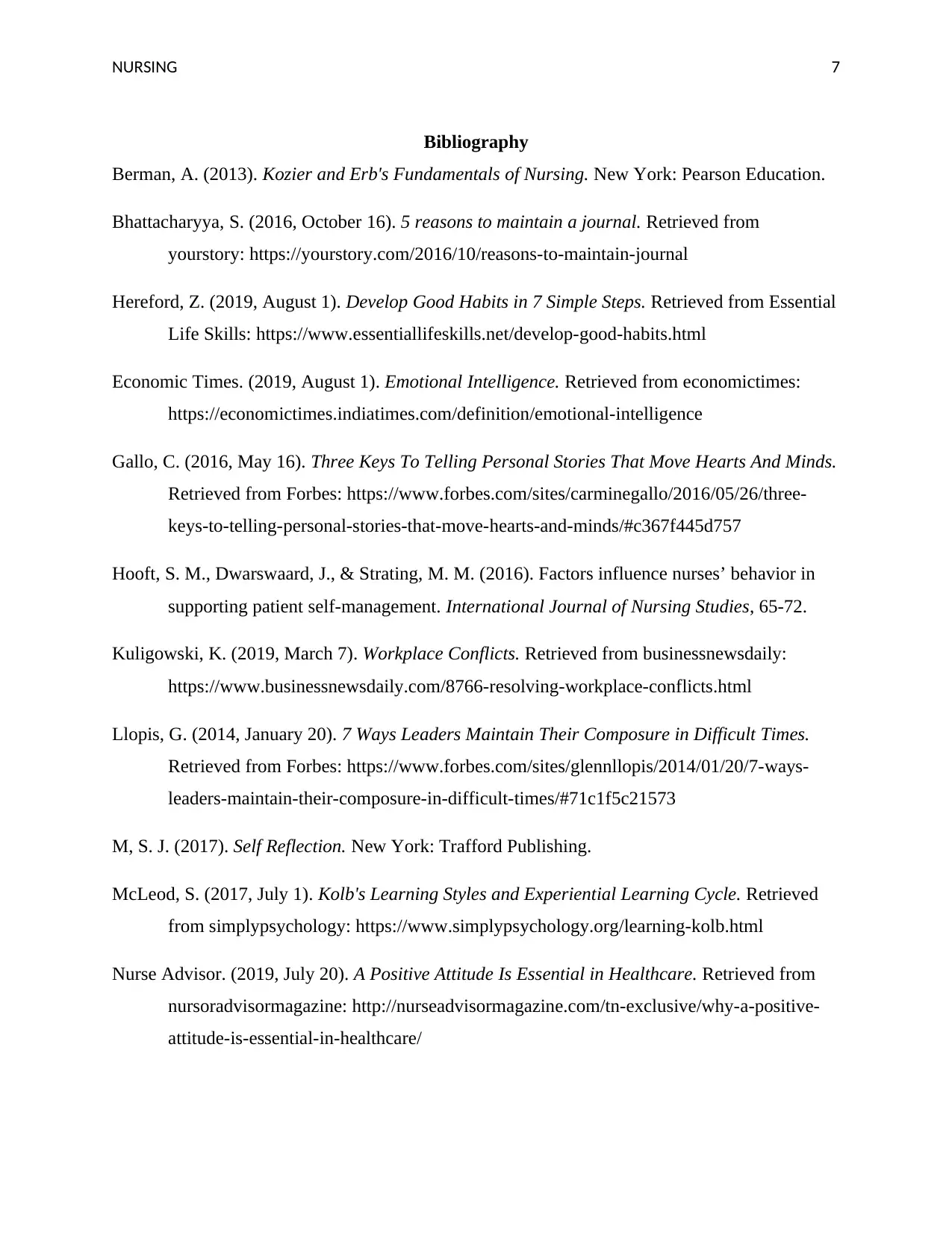
NURSING 7
Bibliography
Berman, A. (2013). Kozier and Erb's Fundamentals of Nursing. New York: Pearson Education.
Bhattacharyya, S. (2016, October 16). 5 reasons to maintain a journal. Retrieved from
yourstory: https://yourstory.com/2016/10/reasons-to-maintain-journal
Hereford, Z. (2019, August 1). Develop Good Habits in 7 Simple Steps. Retrieved from Essential
Life Skills: https://www.essentiallifeskills.net/develop-good-habits.html
Economic Times. (2019, August 1). Emotional Intelligence. Retrieved from economictimes:
https://economictimes.indiatimes.com/definition/emotional-intelligence
Gallo, C. (2016, May 16). Three Keys To Telling Personal Stories That Move Hearts And Minds.
Retrieved from Forbes: https://www.forbes.com/sites/carminegallo/2016/05/26/three-
keys-to-telling-personal-stories-that-move-hearts-and-minds/#c367f445d757
Hooft, S. M., Dwarswaard, J., & Strating, M. M. (2016). Factors influence nurses’ behavior in
supporting patient self-management. International Journal of Nursing Studies, 65-72.
Kuligowski, K. (2019, March 7). Workplace Conflicts. Retrieved from businessnewsdaily:
https://www.businessnewsdaily.com/8766-resolving-workplace-conflicts.html
Llopis, G. (2014, January 20). 7 Ways Leaders Maintain Their Composure in Difficult Times.
Retrieved from Forbes: https://www.forbes.com/sites/glennllopis/2014/01/20/7-ways-
leaders-maintain-their-composure-in-difficult-times/#71c1f5c21573
M, S. J. (2017). Self Reflection. New York: Trafford Publishing.
McLeod, S. (2017, July 1). Kolb's Learning Styles and Experiential Learning Cycle. Retrieved
from simplypsychology: https://www.simplypsychology.org/learning-kolb.html
Nurse Advisor. (2019, July 20). A Positive Attitude Is Essential in Healthcare. Retrieved from
nursoradvisormagazine: http://nurseadvisormagazine.com/tn-exclusive/why-a-positive-
attitude-is-essential-in-healthcare/
Bibliography
Berman, A. (2013). Kozier and Erb's Fundamentals of Nursing. New York: Pearson Education.
Bhattacharyya, S. (2016, October 16). 5 reasons to maintain a journal. Retrieved from
yourstory: https://yourstory.com/2016/10/reasons-to-maintain-journal
Hereford, Z. (2019, August 1). Develop Good Habits in 7 Simple Steps. Retrieved from Essential
Life Skills: https://www.essentiallifeskills.net/develop-good-habits.html
Economic Times. (2019, August 1). Emotional Intelligence. Retrieved from economictimes:
https://economictimes.indiatimes.com/definition/emotional-intelligence
Gallo, C. (2016, May 16). Three Keys To Telling Personal Stories That Move Hearts And Minds.
Retrieved from Forbes: https://www.forbes.com/sites/carminegallo/2016/05/26/three-
keys-to-telling-personal-stories-that-move-hearts-and-minds/#c367f445d757
Hooft, S. M., Dwarswaard, J., & Strating, M. M. (2016). Factors influence nurses’ behavior in
supporting patient self-management. International Journal of Nursing Studies, 65-72.
Kuligowski, K. (2019, March 7). Workplace Conflicts. Retrieved from businessnewsdaily:
https://www.businessnewsdaily.com/8766-resolving-workplace-conflicts.html
Llopis, G. (2014, January 20). 7 Ways Leaders Maintain Their Composure in Difficult Times.
Retrieved from Forbes: https://www.forbes.com/sites/glennllopis/2014/01/20/7-ways-
leaders-maintain-their-composure-in-difficult-times/#71c1f5c21573
M, S. J. (2017). Self Reflection. New York: Trafford Publishing.
McLeod, S. (2017, July 1). Kolb's Learning Styles and Experiential Learning Cycle. Retrieved
from simplypsychology: https://www.simplypsychology.org/learning-kolb.html
Nurse Advisor. (2019, July 20). A Positive Attitude Is Essential in Healthcare. Retrieved from
nursoradvisormagazine: http://nurseadvisormagazine.com/tn-exclusive/why-a-positive-
attitude-is-essential-in-healthcare/
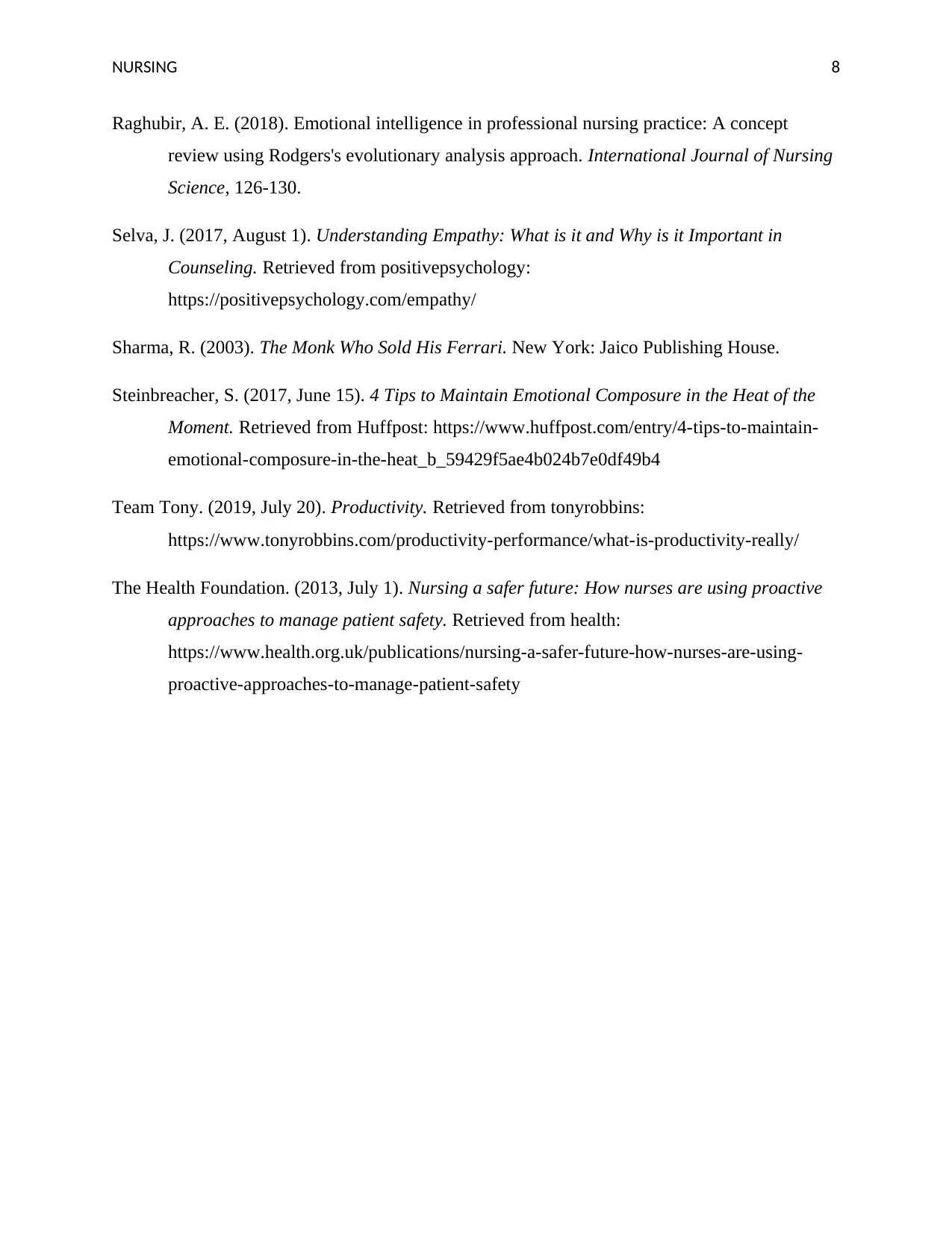
NURSING 8
Raghubir, A. E. (2018). Emotional intelligence in professional nursing practice: A concept
review using Rodgers's evolutionary analysis approach. International Journal of Nursing
Science, 126-130.
Selva, J. (2017, August 1). Understanding Empathy: What is it and Why is it Important in
Counseling. Retrieved from positivepsychology:
https://positivepsychology.com/empathy/
Sharma, R. (2003). The Monk Who Sold His Ferrari. New York: Jaico Publishing House.
Steinbreacher, S. (2017, June 15). 4 Tips to Maintain Emotional Composure in the Heat of the
Moment. Retrieved from Huffpost: https://www.huffpost.com/entry/4-tips-to-maintain-
emotional-composure-in-the-heat_b_59429f5ae4b024b7e0df49b4
Team Tony. (2019, July 20). Productivity. Retrieved from tonyrobbins:
https://www.tonyrobbins.com/productivity-performance/what-is-productivity-really/
The Health Foundation. (2013, July 1). Nursing a safer future: How nurses are using proactive
approaches to manage patient safety. Retrieved from health:
https://www.health.org.uk/publications/nursing-a-safer-future-how-nurses-are-using-
proactive-approaches-to-manage-patient-safety
Raghubir, A. E. (2018). Emotional intelligence in professional nursing practice: A concept
review using Rodgers's evolutionary analysis approach. International Journal of Nursing
Science, 126-130.
Selva, J. (2017, August 1). Understanding Empathy: What is it and Why is it Important in
Counseling. Retrieved from positivepsychology:
https://positivepsychology.com/empathy/
Sharma, R. (2003). The Monk Who Sold His Ferrari. New York: Jaico Publishing House.
Steinbreacher, S. (2017, June 15). 4 Tips to Maintain Emotional Composure in the Heat of the
Moment. Retrieved from Huffpost: https://www.huffpost.com/entry/4-tips-to-maintain-
emotional-composure-in-the-heat_b_59429f5ae4b024b7e0df49b4
Team Tony. (2019, July 20). Productivity. Retrieved from tonyrobbins:
https://www.tonyrobbins.com/productivity-performance/what-is-productivity-really/
The Health Foundation. (2013, July 1). Nursing a safer future: How nurses are using proactive
approaches to manage patient safety. Retrieved from health:
https://www.health.org.uk/publications/nursing-a-safer-future-how-nurses-are-using-
proactive-approaches-to-manage-patient-safety
⊘ This is a preview!⊘
Do you want full access?
Subscribe today to unlock all pages.

Trusted by 1+ million students worldwide
1 out of 9
Your All-in-One AI-Powered Toolkit for Academic Success.
+13062052269
info@desklib.com
Available 24*7 on WhatsApp / Email
![[object Object]](/_next/static/media/star-bottom.7253800d.svg)
Unlock your academic potential
Copyright © 2020–2026 A2Z Services. All Rights Reserved. Developed and managed by ZUCOL.


